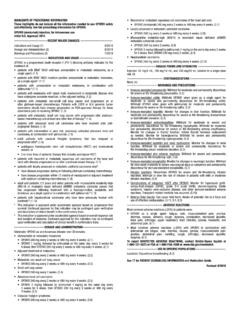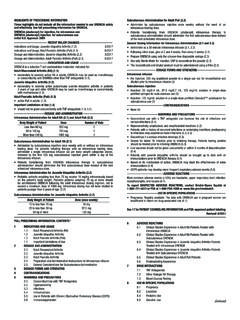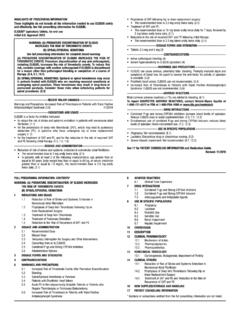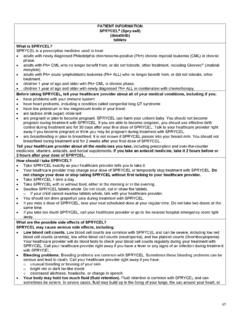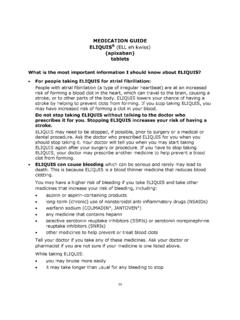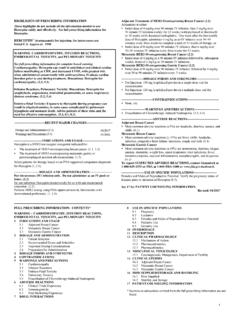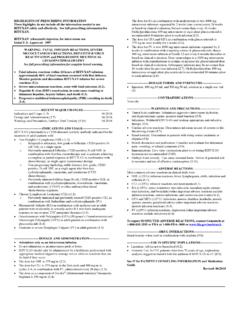Transcription of HIGHLIGHTS OF PRESCRIBING INFORMATION - BMS
1 HIGHLIGHTS OF PRESCRIBING INFORMATION Advanced renal cell carcinoma: These HIGHLIGHTS do not include all the INFORMATION needed to use YERVOY safely Nivolumab 3 mg/kg administered intravenously over 30 minutes followed by and effectively. See full PRESCRIBING INFORMATION for YERVOY. YERVOY (ipilimumab) 1 mg/kg administered intravenously over 30 minutes on the same day, every 3 weeks for 4 doses, then nivolumab 240 mg every 2 weeks or 480 mg every 4 weeks, administered intravenously over 30 minutes. ( ). YERVOY (ipilimumab) injection, for intravenous use Microsatellite instability-high (MSI-H) or mismatch repair deficient (dMMR) metastatic Initial Approval: 2011 colorectal cancer: Nivolumab 3 mg/kg followed by YERVOY 1 mg/kg on the same day every 3 weeks for 4 doses, then nivolumab 240 mg every 2 weeks ( ).
2 WARNING: IMMUNE-MEDIATED ADVERSE REACTIONS. Permanently discontinue for severe adverse reactions. ( ). See full PRESCRIBING INFORMATION for complete boxed warning. YERVOY can result in severe and fatal immune-mediated adverse reactions. ------------------------- DOSAGE FORMS AND STRENGTHS-------------------------- These immune-mediated reactions may involve any organ system; however, the Injection: 50 mg/10 mL (5 mg/mL) and 200 mg/40 mL (5 mg/mL) in a single-use most common severe immune-mediated adverse reactions are enterocolitis, vial.
3 (3). hepatitis, dermatitis (including toxic epidermal necrolysis), neuropathy, and -------------------------------- CONTRAINDICATIONS----------------------- --------- endocrinopathy. The majority of these immune-mediated reactions initially None. (4). manifested during treatment; however, a minority occurred weeks to months after discontinuation of YERVOY. --------------------------- WARNINGS AND PRECAUTIONS--------------------------- Permanently discontinue YERVOY and initiate systemic high-dose corticosteroid Immune-mediated adverse reactions: Permanently discontinue for severe reactions.
4 Therapy for severe immune-mediated reactions. ( ) Withhold dose for moderate immune-mediated adverse reactions until return to Assess patients for signs and symptoms of enterocolitis, dermatitis, neuropathy, baseline, improvement to mild severity, or complete resolution, and patient is and endocrinopathy and evaluate clinical chemistries including liver function receiving less than mg prednisone or equivalent per day. Administer systemic high-dose corticosteroids for severe, persistent, or recurring immune-mediated tests, adrenocorticotropic hormone (ACTH) level, and thyroid function tests at reactions.
5 ( , , , , , , , , , ). baseline and before each dose. ( , , , , ). Immune-mediated hepatitis: Evaluate liver function tests before each dose of YERVOY. ( ) Withhold for moderate and permanently discontinue for severe or life-threatening transaminase or total bilirubin elevation. ( ). ----------------------------- RECENT MAJOR CHANGES------------------------------ Immune-mediated endocrinopathies: Monitor clinical chemistries, ACTH. Indications and Usage (1) 7/2018 level, and thyroid function tests prior to each dose.
6 Evaluate at each visit for Dosage and Administration (2) 7/2018 signs and symptoms of endocrinopathy. Institute hormone replacement therapy as needed. ( ). Warnings and Precautions (5) 7/2018. Immune-mediated pneumonitis: Withhold for moderate and permanently discontinue ------------------------------INDICATION S AND USAGE------------------------------ for severe or life-threatening pneumonitis. ( ). YERVOY is a human cytotoxic T-lymphocyte antigen 4 (CTLA-4)-blocking antibody Immune-mediated nephritis and renal dysfunction: Monitor for changes in renal indicated for: function.
7 Withhold for moderate or severe and permanently discontinue for life-threatening serum creatinine elevation. ( ). Treatment of unresectable or metastatic melanoma in adults and pediatric patients Immune-mediated encephalitis: Monitor for changes in neurologic function. (12 years and older). ( ) Withhold for new-onset moderate to severe neurological signs or symptoms and Adjuvant treatment of patients with cutaneous melanoma with pathologic involvement permanently discontinue for immune-mediated encephalitis. ( ). of regional lymph nodes of more than 1 mm who have undergone complete resection, Infusion reactions: Discontinue for severe and life-threatening infusion reactions.
8 Including total lymphadenectomy. ( ) Interrupt or slow the rate of infusion in patients with mild or moderate infusion reactions. ( ). Treatment of patients with intermediate or poor risk, previously untreated advanced Embryo-Fetal toxicity: Can cause fetal harm. Advise of potential risk to a fetus and use renal cell carcinoma, in combination with nivolumab. ( ). of effective contraception. ( , , ). Treatment of adult and pediatric patients 12 years of age and older with microsatellite instability-high (MSI-H) or mismatch repair deficient (dMMR) metastatic colorectal --------------------------------ADVERSE REACTIONS------------------------------- - cancer that has progressed following treatment with a fluoropyrimidine, oxaliplatin, Most common adverse reactions ( 5%) with YERVOY as a single agent are fatigue, and irinotecan, in combination with nivolumab.
9 This indication is approved under diarrhea, pruritus, rash, and colitis. Additional common adverse reactions at the 10 mg/kg dose ( 5%) include nausea, vomiting, headache, weight loss, pyrexia, accelerated approval based on overall response rate and duration of response. decreased appetite, and insomnia. ( ). Continued approval for this indication may be contingent upon verification and Most common adverse reactions ( 20%) with YERVOY in combination with nivolumab description of clinical benefit in confirmatory trials.
10 ( ) are fatigue, rash, diarrhea, nausea, pyrexia, musculoskeletal pain, pruritus, abdominal ---------------------------DOSAGE AND ADMINISTRATION-------------------------- - pain, vomiting, cough, arthralgia, decreased appetite, dyspnea. ( ). To report SUSPECTED ADVERSE REACTIONS, contact Bristol-Myers Squibb at Unresectable or metastatic melanoma: 1-800-721-5072 or FDA at 1-800-FDA-1088 or YERVOY 3 mg/kg administered intravenously over 90 minutes every 3 weeks for a total of 4 doses. ( ) ---------------------------USE IN SPECIFIC POPULATIONS--------------------------- Adjuvant melanoma: Lactation: Discontinue breastfeeding during treatment with YERVOY.

